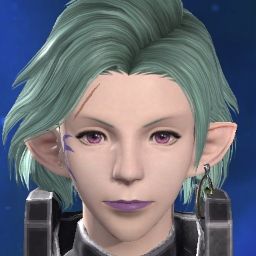It seemed like the same general concept, the crystals were aether and we were giving them to her to feed on them. Irregardless though i just failed to see where it was implied Zodiark was “demanding sacrifices.”I thought we left the Zodiark evul blood god train a long time ago.
-
01-01-2022 01:12 AM #311Player

- Join Date
- Feb 2021
- Posts
- 3,472
- Character
- Kizuya Katogami
- World
- Cerberus
- Main Class
- Conjurer Lv 81
(6)
-
01-01-2022 01:15 AM #312
I'm not sure why people are continuously trying paint the image that the Ancients as a whole were of the mind that this 3rd sacrifice was the way to go, they were not. Venat had a faction of followers who believed in her cause, after all, and as we heard from Elidibus, when numerous Ancients made their disagreements known about this plan, he very willingly disconnected himself from Zodiark for the purposes of reconciliation with Venat and her followers. It is blatantly untrue to say that the Ancients were completely unwilling to compromise or seek alternatives. To argue this is the moment the Convocation became the 'Ascians,' and the point of no return isn't right to me, because still, here we have the very heart of Zodiark himself sensing the conflict and wanting to mediate things. We have no reason to believe this 3rd sacrifice would have occurred inevitably, all we have is a metaphorical cutscene skewed in a very specific point of view. Venat's.
Also, Emet-selch's view of Sundered life is not just born of out of some inherent Ancient sentiment either. We heard from the man himself that he measured the worth of modern people for thousands of years, and concluded they were simply too stupid, violent and frail to care for the star. He's not some prejudiced idiot with no deeper understanding of the world, he's lived more mortal lives than any mortal. He has been rendered bitter by eons of watching people bump into eachother and die, and even then, we know that these were not his complete feelings, but something he was using to remain true to his convictions. The idea that the Ancients don't care in the slightest for lesser life is directly contradicted by the numerous Elpis sidequests, as well as their scholarly understanding that most of their arcane constructs do not have a soul, and thus cannot emulate life. When they can perceive a soul in something, it is a completely different matter entirely, such was the case for the 'immortal bird' in the novella, or the WoL as 'Azem's familiar.' Even if this deduction to determine a life's worth is incorrect, as is attempted to convey with Hermes, this is not then cause to decide the entire world is cruel. At worst they simply don't realize.(15)
-
01-01-2022 01:45 AM #313
-
01-01-2022 02:46 AM #314
I had no idea so many FFXIV players were vegan! Usually this level of judgment isn't something I see outside of vegan communities, so it's interesting to see its prevalence within the FFXIV fandom.
Re: Zodiark
Well, we don't know what life he created, it's all speculation. We do know that the Ancients couldn't create souls, so it'd be reasonable to conclude that neither could Zodiark. Also, aether is aether, I'm not sure it matters where it's sourced.
I found a translation from Japanese of Hythlodaeus' dialog in ShB. It doesn't differ much from the English, but it says: "The earth was dead, the water polluted, and the very wind still. Thus did a further half of the remaining people offer up their lives to Zodiark, that he might cleanse the planet and seed new life on it." This implies that 1) there wasn't enough left living or uncorrupted on the planet to use for aether other than the Ancients themselves and 2) that the 'seeded' new life wasn't fully formed to have enough to aether to use, hence the plan to wait until it had 'flourished'.
Given that context, sacrificing a bunch of saplings wouldn't have been enough aether. Trees that had grown into great oaks would've yielded much more. Also, I don't think people are using "sapient" correctly. None of the new life would've existed long enough to have developed sapience. I think you mean sentient. Regardless, this also brings the timeline into question. Granted, I can only apply real world growth cycles, but even if we assume they were going to sacrifice sentient creatures most of those would've needed about a year to fully develop. I'm speaking specifically of animals here, to be clear. Any humanoids would've required much longer.
Additionally, Elidibus had exited Zodiark to help mediate the conflict within their society and surely they would not have engaged in a third sacrifice while Zodiark lacked his heart, if they had even reached that point since it sounds like it was still under some measure of debate. So, if we assume that Venat had always planned to sunder the star, then there are some significant time gaps and circumstances that don't make sense. You can't say it was to get organized either, the Anyder dialog indicates they had been stalling. I'm left to conclude that Venat actually did believe the Ancients capable of handling Meteion, but perhaps because not enough of them joined her side as quickly as she wanted she decided to take matters into her own hands. It still blows a hole through the dynamis defense since if their only salvation was ever going to be the sundering, then there would've been no reason for her to bother with outreach to her people or to put it off past Zodiark restoring the world.(10)
-
01-01-2022 03:05 AM #315
The ancients were not able to create souls. But I think that if a soul flowed from the aetherial sea into one of thier creations, it would have a soul. Through a process not well understood, that the ancients had no control over. If we're going to assume that zodiark was limited in the same way the ancients were, then he would be creating ensouled life whether he wanted to or not.
Also I have no idea why you would assume real world growth timescales. We saw in the Eden storyline that aetherical acts of reseeding a dead world can happen pretty damn fast - and surely Zodiark would have a lot more aether to work with than Eden did.(5)
-
01-01-2022 05:39 AM #316
If this was their sin, it's one we perpetuate every single day.
Did you just forget the part where the souls within Zodiark say, "We must return and be made whole!"?It's even going against the wishes of those sacrificed; remember that we heard from those souls in Mare Lamentorum, and they are still completely okay with their own sacrifices.
Yes, and I'm saying that the story does fall apart on that level.
You seem to be confused. Again this part of the conversation isn't about the ethics of the rejoining, it's about the question of the Ancient's ability to handle the idea of a dead universe. When that information is revealed neither Venat, nor Emet, nor Hythlodaeus break down in shock from it. Emet and Hythlodaeus soon got their memories wiped and none of their actions related to that idea, while Venat knew and still didn't break down about it. I'm saying there was a serious lack of evidence that this idea would cause the Ancients to destroy themselves.
Why could she not have left and enacted a plan against Meteion? In fact, why do you consider not defeating Meteion a barrier towards a notion of fleeing, when it was already Venat's plan B (plan A being "never unseal Zodiark and safeguard the world forever") and the idea of going to challenge her was plan C?Of course she thought it possible, my point however is that’s not a solution the way silencing the song of oblivion is and would only lead to the destruction of Etheirys and all life.
It's obvious that they are not the same, my point is only that a very vague line of distinction is made purely for the purposes of narrative convenience.Yes, my argument is she is specifically made to restrain Zodiark and Her powers are limited due to the fact that 2/3 of the world did not sacrifice themselves to power Her. If you can’t recognize there may be effects unique to that case then perhaps this discussion will be fruitless.
You're wrong. Flat-out. People do so every day without even thinking about it. WoL has done it on countless occasions.I choose to believe 99% of people wouldn’t sacrifice innocent lives.
Venat does not say that they would specifically need Hermes "expertise" for anything. She says "well he's smart, and maybe his intelligence will be useful?" If you actually pay attention to her dialog in this scene, she suggests to WoL that the world may be completely different when you return to your own time, meaning that she is actually intending to do things differently. And yet she also says that the others being mind-wiped may have set the stage for a conjunction leading to the timeline remaining the same, meaning she knows that not telling the others increases the chances that everything goes unchanged and the Ancient's world is destroyed.Then don’t take my word for it. Here’s Venat.
Not only is the entire thing a godawful contrivance with little logic behind it, what Venat is talking about with Hermes there is her MO to a T - Withhold knowledge from someone and try to manipulate them into aiding your cause, even when revealing the truth of the situation to them might make them your enemy. To be clear, this is a mistake, and leads to the deaths of billions as the Ancient's world is razed while everyone is scrambling around to figure out the cause of the situation. Keep in mind that she also says that she needs to "prepare their defenses", and yet absolutely nothing comes of this.
They didn't buy her arguments regardless. Either way she was predicating them on lies.And then you must concede you have 0 evidence of this.
That was quite literally their plan with the third sacrifice.I wonder why they didn’t just breed a bunch of chickens and sacrifice them to Zodiark then.
The crystals were explicitly used as an energy source, both to bring you to the aetherial sea to meet Minfilia and to take her and the Warriors of Darkness back to the First. Iirc the journal even describes WoL's crystal as having been "spent" afterwards.
There's something to note here that I think hasn't been recognized very much - Emet-Selch's motives and ideals and Venat's motives and ideals appear to be exactly the same, simply flipped around. Emet believed that the Sundered were morally and physically deficient, selfish, indolent, given to the temptations of power, and both magically and ethically incapable of true fulfillment, and so they must be rejoined. Whereas Venat believed that the Ancients were morally and physically deficient, selfish, indolent, given to the temptations of power, and both magically and ethically incapable of true fulfillment, and so they must be sundered. Many of the arguments that were once applied to the Sundered, that they were inferior beings prone to self-destruction, are now being turned around and used with the Ancients to justify their destruction without a hint of irony.
It's stuff like this that makes me question whether the story was actually some kind of grand 5D meta commentary on the nature of narrative presentation and audience reception, or if everything was just a complete accident and they just unintentionally doubled back on a bunch of ideas they were trying to dispute.(9)Last edited by Veloran; 01-01-2022 at 05:42 AM.
-
01-01-2022 05:39 AM #317
And I didnt know that my meal would be able to hold a conversation with me.
We cant prove what life it was. But it is imo quite telling that the end goal of the Ascians was to sacrifice the remaining people of the source after every rejoining was done. Those would have been people with complete souls. People who once might have been Ancient themselves. So I have a hard time seeing how back in the days when they were also already tempered they would not think about "lesser" races as not suitable.
Heck we are seen as nothing but a familiar simply because we have a less dense soul. We talk with them, we clearly show emotions and other than the soul we can basically look like them and yet we are still just familiars. An interesting, cute creation but nothing much more.
I can still quite see that they would sacrifice someone like the WoL (or even Meteion) to get one of their owns back. After all we are just a concept and can be recreated afterwards.
And I really doubt that the third plan would have created such a huge amount of conflict that Elidibus had to leave Zodiark if the plan was to create a chicken farm and sacrifice them to get their people back. Not when seemingly the majority of the Ancients had no problem creating and destroying their concepts even if it had a soul. No for me it makes only sense if they had planned to do it to new life that was seemingly above the normal creations (and who would also have a whole soul unlike us!)
Of course it could also be that some found it to be absolutely horrible to sacrifice the new life that was created by the second sacrifice. After all even Emet was horrified about his future self. After all death was an honor and the sacrificed souls were seemingly quite happy to be the matyr of the star.(2)Last edited by Alleo; 01-01-2022 at 05:45 AM.
-
01-01-2022 05:44 AM #318Player

- Join Date
- Mar 2019
- Location
- Gridania
- Posts
- 475
- Character
- Denishia Squirrel
- World
- Brynhildr
- Main Class
- Fisher Lv 100
Ardbert had a vastly less dense soul than us. Was he any less worthy?
(1)
-
01-01-2022 06:08 AM #319
Given that both the source and the first are populated by Roegadyn, Miqo'te, Au Ra - etc. I don't think it is a huge leap in logic to assume that those and others were the races that populated the star pre-sundering. In other words, sentient life, and potential victims for the ancient's sacrifice plan.
(2)
-
01-01-2022 06:13 AM #320
Or it could be that since the sundering split the world, the ancients got split into the seperate races at that point and thus they exist on all worlds. Emet and Hythlo, after they size you up, don't seem to recognize you as like a hrothgar or something just general comments about your stature and that would be extremely strange if they already exist. Because of Azem, they both should be very well traveled and should have seen them somewhere. Even if we chalk it up to the ancients thinking they're superior to everyone else, they should still recognize the races when they see them. Also Varis claims directly that the sundering led to the different races.
(4)Last edited by Garnetiferous; 01-01-2022 at 06:14 AM. Reason: grammar



 Reply With Quote
Reply With Quote















